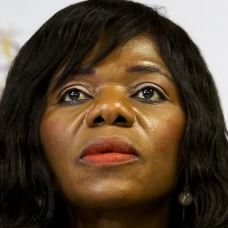
Lifestyle/Community

Madonsela is passionate about Constitution
TALI FEINBERG
In the discussion, arranged by the Cape SA Jewish Board of Deputies, the two spoke about the challenges, successes and aims of the Public Protector’s work in the country today.
Most democracies today have a national institution similar to the Public Protector, empowered by legislation, in our case our Constitution, which helps in establishing and maintaining efficient and proper public administration and in “investigating and redressing improper and prejudicial conduct, maladministration and abuse of power in state affairs”, according to its stated mission.
While the discussion focused mainly on national politics, it demonstrated the Jewish community’s commitment to engaging with South African society and its challenges.
Getting down to the “R246 million dollar question”, in Leon’s words, the two discussed Madonsela’s report on President Jacob Zuma’s Nkandla homestead, where she had stated that Zuma and his family had unduly benefited from some of the upgrades at his home and suggested that he pay back some of the money.
But Madonsela would not criticise the president directly, saying that she “tries not to personalise things. We rather ask how best we can help the President regarding the enforcement of ethics.”
She added that she thought her report on Nkandla would be resolved to her satisfaction, no matter how long it took.
Leon put to Madonsela the question of why she thought she was so well known, while her predecessors had been practically “invisible”.
“They had to make simpler decisions, and had to build this office from scratch. I stand on their shoulders and therefore ‘higher ground’,” she answered.
Questions from the audience included whether she had ever feared for her safety. She admitted that her family “was concerned”.
Asked about her plans for the future, she re-emphasised that she “has no interest in going into politics”.
On why corruption seemed so prevalent and widespread, she answered: “We are actually not the most corrupt country; we’re in fact one of the most transparent. Our Constitution is a sacrosanct agreement between citizens and those in power and my aim is for everyone to know it, so that leaders can be held accountable.
“What I’m proud of is that South Africans are saying ‘no’ to maladministration, which is why we are hearing more about it. There are many institutions that are successful in fighting these challenges, but these are not grounds for resting on our laurels. Every South African has to play their part.”
Cape South African Jewish Board of Deputies Chairman Eric Marx, in kicking off the event, reiterated that the South African Jewish Board of Deputies “works for the betterment of human relations in South Africa and debates issues of concern for all South Africans. We draw inspiration from our Jewish values and traditions to effect social change.”
This view was echoed by Gardens Synagogue Rabbi Osher Feldman, who said that the parsha of the week in fact dealt with accountability, describing how Moses ensured that a record was kept of all the precious metals used to build the Mishkan.
“Stories like these demonstrate how Judaism expects every person in power to behave beyond reproach,” he said.
These ideas were echoed by Madonsela herself, who said that one of her aims during her years in office had been to encourage more people to be aware of corruption, engage government and to expect accountability. She added: “We [the office of the Public Protector] get more acclaim than we deserve. We are not the only problem-solvers – we are simply one of many.”
Describing the limits and challenges of her work, she told the audience: “We only have the power to make findings and recommendations.”
Yet she hoped systems would be put in place to enforce them. Since the fall of the Scorpions, she said, even more corruption cases had come to her office, but had not all been adequately dealt with yet, due to a lack of resources.




